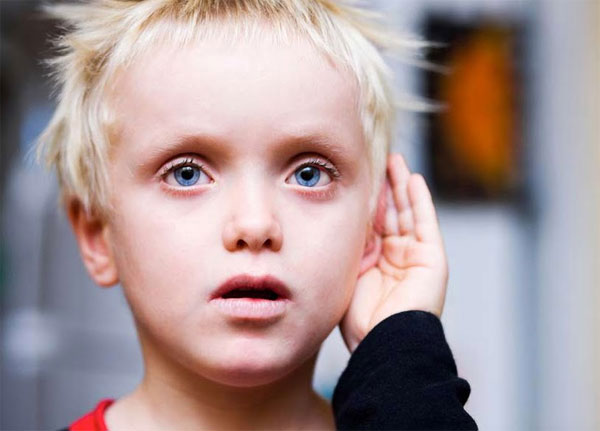Adenoids are lumpy clusters of spongy tissue on the side of the throat behind the nose and the roof of the mouth. Read on. Unlike tonsils which can easily be seen if you open your mouth wide, adenoids need a small mirror and a special scope. Adenoids act as a barrier to infection. They trap bacteria and virus, and produce antibodies against possible infections. Adenoids get less important as the child grows older and the body builds other mechanisms to fight germs. Adenoids shrink and usually become insignificant by the late teens or early twenties. In this articleWhen Adenoids SwellEnlarged AdenoidsSurgeryPreparing for surgeryAfter the AdenoidectomyWhen Adenoids Swell If you notice your child often has green or yellow mucus, there may be an underlying problem (enlarged adenoids, for instance) thats causing recurring bacterial infections. Sometimes adenoids get puffier and swell with all the bacteria. The swelling sometimes goes away by itself and sometimes it needs medical intervention. Swollen or infected adenoids can make it difficult for a child to breathe. Enlarged Adenoids When adenoids are enlarged, it may be hard to breathe through the nose. Other signs of constant enlargement are: Breathing through the mouth instead of the nose most of the time Nose sounds "blocked" when the person speaks Noisy breathing during the day Recurrent ear infections Snoring at night Breathing stops for a few seconds at night during snoring or loud breathing (sleep apnea) Enlarged adenoid alone, or combined with tonsillar enlargement, can cause nasal obstruction, recurrent ear infections, or sinusitis. When these conditions cannot be helped through medication, doctors recommend surgery. Tonsillectomy and adenoidectomy are indicated only when the child has repeated or persistent infections, particularly if they interfere with everyday activities. In general, repeated infections in children are defined as 6-7 episodes in one year, or 4-5 episodes in each of two years, or 3 episodes in each of three years. A significant episode of tonsillitis is defined by one or more of the following criteria: (1) a temperature greater than 101 F; (2) enlarged or tender neck lymph nodes; (3) pus material coating the tonsils; or (4) a positive strep test. Surgery Carried out through the mouth under a general anaesthetic, adenoidectomy involves the adenoids being curetted, cauterised, lasered, or otherwise ablated. The actual procedure is a days work. Many patients are released after eight to 10 hours. Others are kept overnight. Preparing for surgery Talk to your child about her feelings. Reinforce the fact that this is being done to make her healthier. Tell her to expect a sore throat after surgery. Reassure your child that the operation will not remove anything important and her friends will not be able to notice anything different afterwards. If your child has a friend who has had this surgery, may be it would help to have the friend describe what happens (be present however, in case the friends imagination gets too vivid). After the Adenoidectomy Your child may be sent home with a weeks course of antibiotics to be taken by mouth. Usually moderate pain is felt at the back of the nose and throat, for which painkillers are given by the doctor. Normally, the pain disappears after a week. Let the child take it easy for a week and bunk school to avoid possible infections at school. No swimming for at least 10 days after the operation.
Adenoids are lumpy clusters of spongy tissue on the side of the throat behind the nose and the roof of the mouth. Read on. Unlike tonsils which can easily be seen if you open your mouth wide, adenoids need a small mirror and a special scope.
Adenoids act as a barrier to infection. They trap bacteria and virus, and produce antibodies against possible infections. Adenoids get less important as the child grows older and the body builds other mechanisms to fight germs. Adenoids shrink and usually become insignificant by the late teens or early twenties.
When Adenoids Swell
If you notice your child often has green or yellow mucus, there may be an underlying problem (enlarged adenoids, for instance) that's causing recurring bacterial infections.
Sometimes adenoids get puffier and swell with all the bacteria. The swelling sometimes goes away by itself and sometimes it needs medical intervention. Swollen or infected adenoids can make it difficult for a child to breathe.
Enlarged Adenoids
When adenoids are enlarged, it may be hard to breathe through the nose. Other signs of constant enlargement are:
- Breathing through the mouth instead of the nose most of the time
- Nose sounds "blocked" when the person speaks
- Noisy breathing during the day
- Recurrent ear infections
- Snoring at night
- Breathing stops for a few seconds at night during snoring or loud breathing (sleep apnea)
Enlarged adenoid alone, or combined with tonsillar enlargement, can cause nasal obstruction, recurrent ear infections, or sinusitis. When these conditions cannot be helped through medication, doctors recommend surgery.
Tonsillectomy and adenoidectomy are indicated only when the child has repeated or persistent infections, particularly if they interfere with everyday activities. In general, repeated infections in children are defined as 6-7 episodes in one year, or 4-5 episodes in each of two years, or 3 episodes in each of three years. A significant episode of tonsillitis is defined by one or more of the following criteria: (1) a temperature greater than 101 F; (2) enlarged or tender neck lymph nodes; (3) pus material coating the tonsils; or (4) a positive strep test.
Surgery
Carried out through the mouth under a general anaesthetic, adenoidectomy involves the adenoids being curetted, cauterised, lasered, or otherwise ablated.
The actual procedure is a day's work. Many patients are released after eight to 10 hours. Others are kept overnight.
Preparing for surgery
Talk to your child about her feelings. Reinforce the fact that this is being done to make her healthier. Tell her to expect a sore throat after surgery. Reassure your child that the operation will not remove anything important and her friends will not be able to notice anything different afterwards. If your child has a friend who has had this surgery, may be it would help to have the friend describe what happens (be present however, in case the friend's imagination gets too vivid).
After the Adenoidectomy
Your child may be sent home with a week's course of antibiotics to be taken by mouth. Usually moderate pain is felt at the back of the nose and throat, for which painkillers are given by the doctor. Normally, the pain disappears after a week.
Let the child take it easy for a week and bunk school to avoid possible infections at school. No swimming for at least 10 days after the operation.































